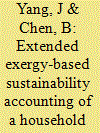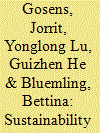| Srl | Item |
| 1 |
ID:
133144


|
|
|
|
|
| Publication |
2014.
|
| Summary/Abstract |
Biogas has been earmarked as one of the leading renewable energy sources capable of mitigating environmental emissions in rural areas. Thus, developing an accounting technique is of particular importance in coping with increasing problems related to renewable agriculture and rural energy supply. In this study, extended exergy was generalised for the sustainability evaluation of biogas projects. Furthermore, a series of extended exergy-based indicators was presented as benchmarking from the perspectives of resources, economics and greenhouse gas (GHG) emissions. The sustainability of a "Three-in-One" biogas production system in southern China was thereby evaluated based on the proposed framework. The results show that economic costs concentrate in the construction phase. GHG emissions are mainly derived from bricks and cement, with proportions of 36.23% and 34.91%, respectively. The largest resource depletion occurs during the consumption of feedstock (87.06%) in the operation phase. Compared with other renewable energy conversion systems, the biogas project has a higher renewability (0.925) and economic return on investment ratio (6.82) and a lower GHG emission intensity (0.012). With the merit of bridging thermodynamics and externality, the extended exergy-based approach presented in this study may effectively appraise the energy and environmental performance of biogas projects.
|
|
|
|
|
|
|
|
|
|
|
|
|
|
|
|
| 2 |
ID:
118842


|
|
|
|
|
| Publication |
2013.
|
| Summary/Abstract |
Households in rural China rely heavily on low quality fuels which results in reduced quality of life and environmental degradation. This study assesses the comparative contribution of household scale biogas installations to the broad set of sustainability objectives in the Chinese biogas policy framework, which targets household budget, fuel collection workload, forest degradation, indoor air quality and health, renewable energy supply, and climate change. A household survey was used to determine how biogas affected consumption levels of crop residues, fuel wood, coal, LPG, and electricity. Biogas users were found to reduce consumption of biomass fuels but not coal. Although LPG is not a highly commonly used fuel in rural China, biogas users nearly cease to use it altogether. A big reduction in fuel wood consumption results in strongly reduced workload and forest degradation. Although household scale biogas has alleviated all sustainability issues targeted by Chinese policies, low quality fuel use remains abundant, even in households using biogas. Continued promotion of the construction of biogas installations is advisable, but additional policies are needed to ensure higher quality heating energy supply and cleaner uses of biomass fuels.
|
|
|
|
|
|
|
|
|
|
|
|
|
|
|
|